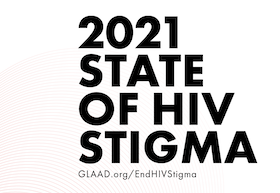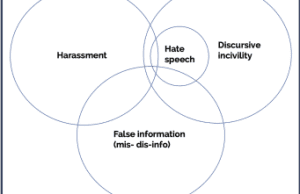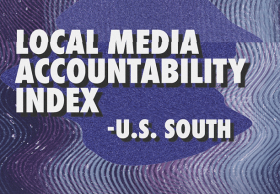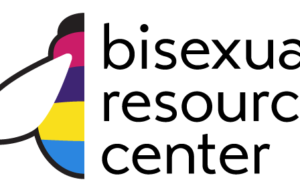GLAAD releases 2021 State of HIV Stigma Study

GLAAD, the world’s largest lesbian, gay, bisexual, transgender and queer (LGBTQ) media advocacy organization, is releasing its second annual State of HIV Stigma Study, a national survey among U.S. adults with the sample supplied by research firm Cint. The survey, funded by Gilead COMPASS Initiative®, measures American attitudes toward HIV and people living with HIV.
GLAAD also reviewed the history and current state of HIV stigma in the media to offer recommendations to increase and improve HIV coverage. Leaders in HIV education and treatment also share recommendations for defeating stigma in all areas of society.
Read the full study here
Study findings:
-
48% of American adults feel knowledgeable about HIV, down 3 points from the last year
-
87% believe there is still stigma around HIV
-
Only 42% know the fact that people living with HIV cannot transmit it while on proper treatment
-
53% of non-LGBTQ people surveyed noted they would be uncomfortable interacting with a medical professional who has HIV; 43% uncomfortable around a hair stylist or barber living with HIV, 35% with a teacher living with HIV
-
Levels of discomfort around people living with HIV are higher in the Midwest and highest in the U.S. South
Following last year’s alarming survey results, GLAAD took action with a $9 million multi-year grant from Gilead’s COMPASS Initiative to combat HIV stigma in the U.S. South. The program, called ‘Accelerate Compassion’ and ‘Accelerate Impact,’ includes media trainings for hundreds of LGBTQ advocates in the South and works with regional media to improve the quantity and quality of LGBTQ coverage. Additionally, the program also includes recent staff hires to support this vital regional and national work.
Quote from DaShawn Usher, GLAAD Associate Director, Communities of Color:
“For the second year in a row, we are finding that HIV stigma remains high while HIV knowledge remains low amongst Americans. We have to think critically and intentionally about how we truly equip and engage everyday Americans with the facts, resources, and scientific advancements about HIV if we want to end the epidemic. We must hold the media accountable to the 1.2 million Americans living with HIV who are not seen, represented, or discussed. Their stories matter and are beyond worthy of being told.”
Quote from Gilead Sciences:
“Only half of Americans are knowledgeable about HIV/AIDS, which shows that, while we’ve made progress, there is still much more to do in educating the public and removing the stigma around HIV/AIDS,” said Brett Pletcher, Executive Vice President, Corporate Affairs and General Counsel, Gilead. “That’s why we are proud to team up with organizations like GLAAD. This new information will help us better target our COMPASS Initiative to end HIV in the South. We cannot end the epidemic until we stop the stigma, and GLAAD is on the frontline of that effort.”
Queer Eye star Jonathan Van Ness, who is living with HIV, issues statement to GLAAD:
“We continue to do our work of educating folks on living with, the treatment of, and prevention of HIV/AIDS, but a culture stigma and ignorance still exists for so many people. A lack of compassion and stigma will continue to allow HIV/AIDS to hurt people in all communities until everyone in every community prioritizes ending the judgment and cruelty that is preventing healing for everyone affected by the HIV/AIDS pandemic.”
GLAAD Media Consultant and Researcher Dr. Jonathan P. Higgins studied the impact of media coverage on HIV stigma. Celebrities and others with platforms can influence the spread of misinformation or help promote accurate information about HIV and how it is preventable and treatable, and when those who have HIV are treated properly, cannot sexually transmit HIV and can lead long, healthy lives.
On August 4th, GLAAD and 10 HIV advocacy organizations released an open letter to rap artist DaBaby, calling for a private meeting to discuss his recent inaccurate and harmful comments about HIV that worsen stigma. As of August 26th, more than 110 additional supporting organizations advocating for HIV education and people living with HIV have signed onto the letter.
GLAAD can connect journalists to HIV advocates and medical experts for interviews and additional background information.
Facts about HIV:
-
People living with HIV today, when on effective treatment, lead long and healthy lives and cannot transmit HIV. Treating HIV can suppress the virus to the point it is no longer detected. When it is undetected, it is untransmittable, the key message of the U=U campaign.
-
Approximately 1.2 million people in the U.S. have HIV. 13% of them don’t know it, reinforcing the need for HIV testing and to end stigma around HIV testing.
-
People most vulnerable to HIV have limited access to transportation, housing, healthcare, and social support.
-
Black Americans account for more HIV diagnoses (43%), people living with HIV (42%), and the most deaths among people with HIV (44%) than any other racial and ethnic group in the U.S.
-
The CDC reports that the U.S. South experiences the greatest rates of HIV and lags behind in providing quality HIV prevention services and care.
-
Medications like PrEP protect people who do not have HIV from contracting HIV. The CDC states that PrEP reduces the risk of getting HIV from sex by about 99% when taken as prescribed.
Methodology:
The State of HIV Stigma Study 2021 was conducted through an online survey between January 14, 2021 to January 29, 2021, among a sample of 2517 U.S. adults, 18 years or over. The data’s sample sourced and aggregated through CINT, the world’s largest consumer network for digital survey-based research with access to 144 million panel members globally, was consistent with the inaugural 2020 sample survey. The data set tested at 95% and 90% confidence levels; additional significance tests were conducted for year over year shifts.
About GLAAD:
GLAAD rewrites the script for LGBTQ acceptance. As a dynamic media force, GLAAD tackles tough issues to shape the narrative and provoke dialogue that leads to cultural change. GLAAD protects all that has been accomplished and creates a world where everyone can live the life they love. For more information, please visit www.glaad.org or connect with GLAAD on Facebook and twitter.














